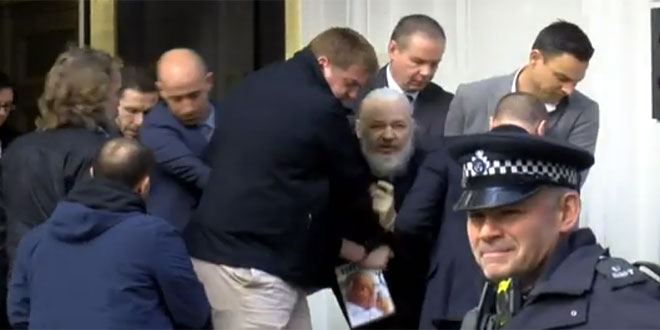WikiLeaks founder Julian Assange has been dragged out of the Ecuadorian Embassy in London where he has spent the last six years. That’s after Ecuador’s president Moreno withdrew asylum, RT reported.
The arrest came a day after WikiLeaks Editor-in-Chief Kristinn Hrafnsson claimed that an extensive spying operation was conducted against Assange in the Ecuadorian Embassy. During an explosive media conference Hrafnsson alleged that the operation was designed to get Assange extradited.
Assange’s relationship with Ecuadorian officials appeared increasingly strained since the current president came to power in the Latin American country in 2017. His internet connection was cut off in March of last year, with officials saying the move was to stop Assange from “interfering in the affairs of other sovereign states.”
The whistleblower garnered massive international attention in 2010 when WikiLeaks released classified US military footage, entitled ‘Collateral Murder’, of a US Apache helicopter gunship opening fire on a number of people, killing 12 including two Reuters staff, and injuring two children.
The footage, as well as US war logs from Iraq and Afghanistan and more than 200,000 diplomatic cables, were leaked to the site by US Army soldier Chelsea Manning. She was tried by a US tribunal and sentenced to 35 years in jail for disclosing the materials.
Assange’s seven-year stay at the Ecuadorian Embassy was motivated by his concern that he may face similarly harsh and arguably unfair prosecution by the US for his role in publishing troves of classified US documents over the years.
In December 2010, he was arrested in the UK under a European Arrest Warrant and spent time in Wandsworth Prison before being released on bail and put under house arrest.
WikiLeaks is responsible for publishing thousands of documents with sensitive information from many countries. Those include the 2003 Standard Operating Procedures manual for Guantanamo Bay, the controversial detention center in Cuba. The agency has also released documents on Scientology, one tranche referred to as “secret bibles” from the religion founded by L. Ron Hubbard.
Former President Correa slams Moreno over Assange’s arrest
Ecuador’s former president Rafael Correa has slammed his successor Lenin Moreno for “allowing” police to arrest Julian Assange at the Ecuadorian embassy in London, calling the action a “crime humanity will never forget.”
George Galloway, political firebrand, told RT that he is “shocked,” Julian Assange, has been arrested, claiming a great crime has been committed against the Wikileaks founder, insisting the Ecuadorian and UK govts should feel ashamed of such action.
“Shame on the Ecuadorian government, shame on the British government and shame on those that let this happen,” he said.
‘No journalist will be safe from extradition to the US for doing his job’ – Wikileaks editor warns
Commenting on Assange’s arrest, WikiLeaks editor Kristinn Hrafnsson has said that Julian Assange is facing “political persecution” for “doing his job as a journalist,” and vowed to fight his extradition to the US.
Speaking to reporters outside Westminster Magistrates Court, Hrafnsson said that Assange’s removal from the Ecuadorian embassy – where he had been seeking asylum for almost seven years – “sets a horrible precedent.”
“A journalist is facing political persecution for doing journalism,” Hrafnsson added. “If this goes forward, no journalist anywhere in the world will be safe from extradition to the United States for doing his job.”
‘Dark moment for press freedom’: Edward Snowden responds to Assange arrest
Fellow whistleblower Edward Snowden has responded to the arrest of Julian Assange in London, tweeting that the images of Ecuadorian authorities handing him over to UK police were a “dark moment for press freedom.”
In the tweet, Snowden said the images of a publisher of “award-winning journalism” being dragged out of the embassy would “end up in the history books.”
H.M

